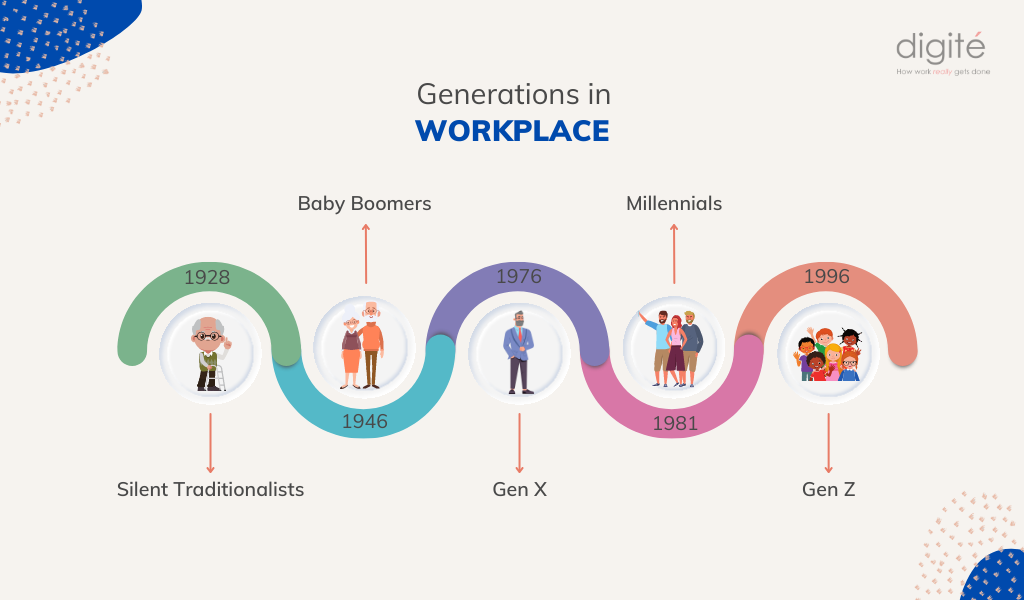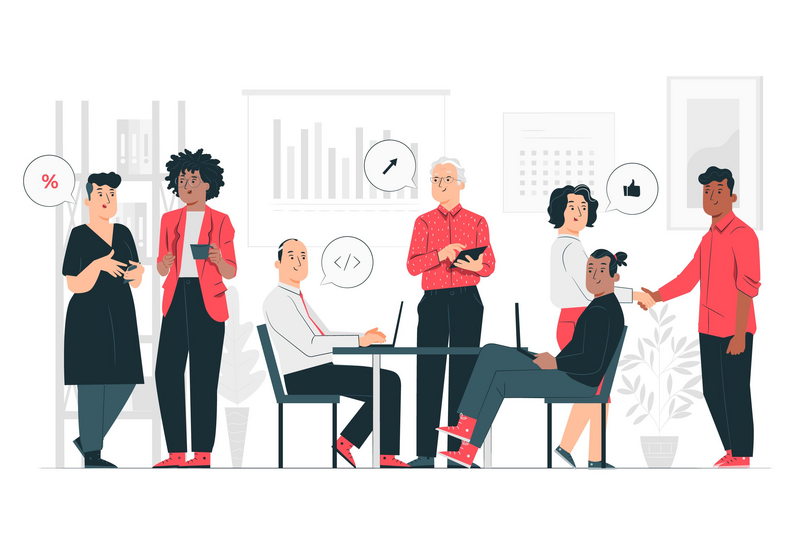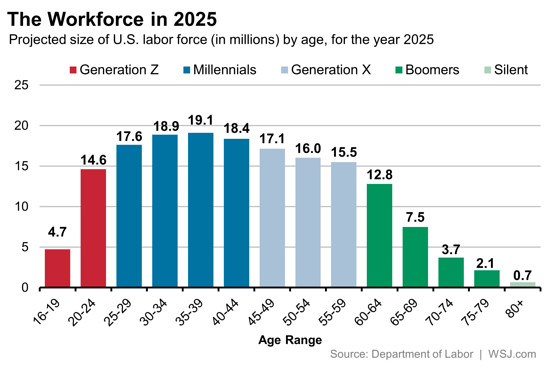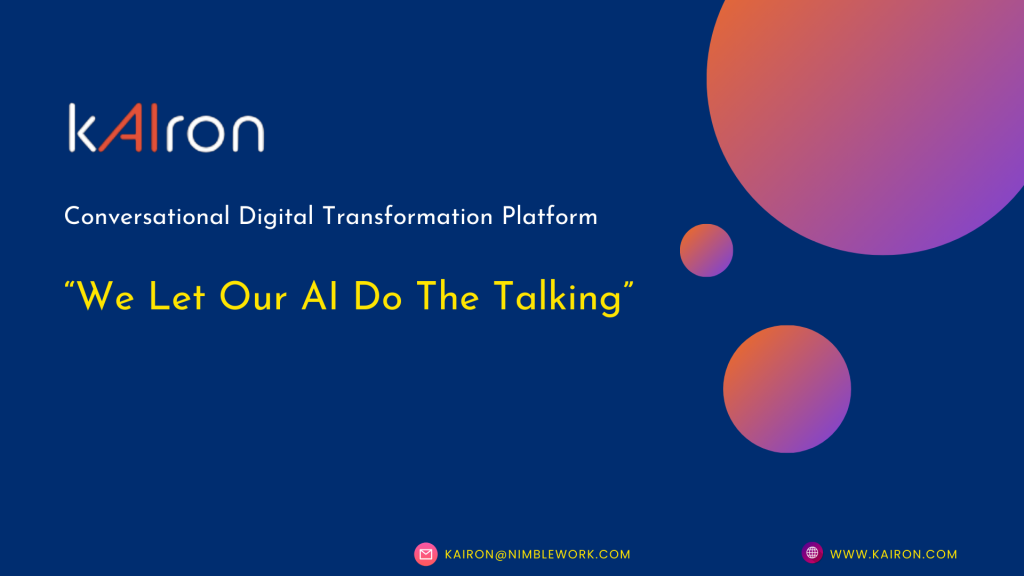- Why Nimble?
- Products
_____________________
_____________________
- Solutions
- Customers
- Resources
- Login
- Try Nimble for Free
- Why Nimble?
- Products
_____________________
_____________________
- Solutions
- Customers
- Resources
- Login
- Try Nimble for Free
Navigate to
Generational Differences at Work: Is It a Real Issue?
- 15 mins read
- By Marjan Venema
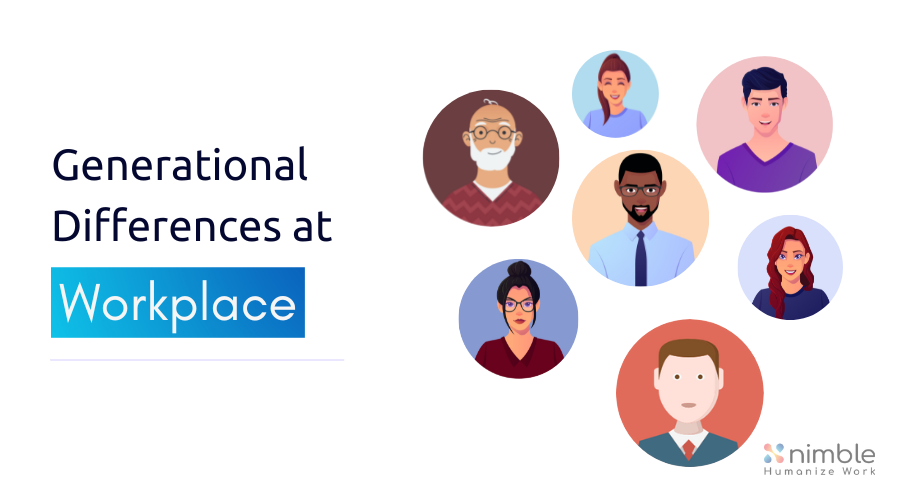
Generational differences at work received a lot of attention over the years.
Your first experience of a generation gap probably was arguing with your parents about how you and they see the world. If you have kids, you’re now facing the same thing from the other end.
With 5 generations simultaneously in the workplace, inevitably, there are differences between them. If not between two successive generations, then between those with at least one in between.
But do these differences pose a problem?
Yes, there are plenty of issues at work that fall along generational lines. It makes total sense to think they’re caused by generation gaps.
But are they really?
And if they are, is addressing them as generational issues the best way forward?
Let’s see, and let’s start with a bit of groundwork.
Generations and Generation Gaps 101
What Are Generation Gaps?
A generation gap refers to differences in worldview and values of individuals belonging to different generations and the effects that has on their behavior and responses to others.
As mentioned above the best known generation gaps are those between parents and children, and between grandparents and grandchildren.
What Are Generational Differences in the Workplace?
Generational differences in the workplace are differences in worldview, motivational drivers, and communication styles between workers belonging to different generations.
For the workplace, generations are not defined in familiar terms but refer to groups of individuals who were born in the same span of years.
What is Multigenerational Diversity in the Workplace?
Multigenerational diversity in the workplace means having people from a number of different generations working in your organization. You could have people from just two generations, for example, baby boomers and millennials working for you. Or you could have individuals from all five generations throughout your organization.
What Are the 5 Generations in the Workplace Today?
The five generations as they are commonly defined and named are:
- The traditionalist or silent generation. Born before 1945, the end of World War II. Some definitions only include individuals born after 1928, the Great Depression.
- The baby boomer generation. Born anytime in the period from 1946 to 1964.
- The gen-x generation (generation X). Born after 1965 and before 1976 or 1980, depending on whose definition you use.
- The millennial generation. Born between 1977/1981 and 1995 or 2000.
- The gen-z generation (generation Z). Born between 1996/2001 and 2012/2015/2020.
As you can see, there’s quite a bit of variation in the birth years used to determine whether someone belongs to gen-x, is a millennial, or receives a gen-z label.
That’s because there are multiple definitions of what constitutes a generation.
How Are Generations Defined?
Generally speaking, generations are separated by the dates of major global events.
The reason is that those events exert a defining influence on individuals born in that era.
For example, having lived through the Great Depression and World War II, is assumed to have had an influence on your worldviews and what motivates you to get and keep a job.
Major technological developments also play a part.
For example, the Internet ‘going public’ and the proliferation of mobile telephones and now smartphones. They are thought to have had a profound effect on the preferred communication method (medium) of millennials and gen-z.
So why the differences in years?
That’s because generational researchers who create these definitions, use different events, or different criteria to pick their start and end.
For example, some researchers require someone to have experienced an event consciously.
Take 9/11, for example. It’s often used as the cut off point between millennials and gen-z. Whether you adhere to the ‘experienced consciously’ criterion determines whether you use 2001 as the start for gen-z, or put it some 5 years earlier.
Why Are Generational Differences Important?
Generational differences are deemed important because they are thought to cause two types of issues that left unaddressed can negatively affect your bottom line.
1. Staffing Issues
The first type are staffing issues.
Differences in values and worldviews thought to be related to people’s generation, lead them to prioritize different aspects with regard to pay, benefits, career paths, etc.
If your organization’s packages are attuned to the wants and needs of just one or two generations, you’ll face challenges in attracting and retaining people from the other ones.
2. Interpersonal Issues
The second type are interpersonal issues.
Friction between people because of differences in values and worldviews that are thought to be related to their age, i.e. their generation. It can lead to work relations fraught with sensitivities and potentially flaring tempers.
Not what you want when your bottom line depends on communication and collaboration.
What Issues Arise From Generation Gaps?
Following is a non-exhaustive list of differences that can cause friction, whether that’s between individuals of the same or different generations.
Note that all statements about earlier and later generations are tendencies. It means that people who fall in a later or earlier generation on average behave as described, not that all of them do.
- Sticking to the required hours instead of staying late
Earlier generations tend to put in hours well above the required number. Later generations tend to stick to the required hours.
Note that it’s not actually about the hours. It’s that some people take putting in long hours as an indication of commitment to the job. And it’s the supposed lack of commitment that causes judgments which interfere with work relationships.
- Using text and email instead of phoning or speaking face to face
Some things are best discussed face-to-face. Sensitivities differ as to what can and what shouldn’t be said via email, text, or chat.
Earlier generations tend to prefer IRL face to face conversations — especially around difficult subjects. Later generations tend to do everything via tech (yes, blatant over-generalization).
Different preferences aren’t as often an issue as you might assume. In my experience, people quickly adapt to using my preferred channel when they figure out (or tell them) that’s the best way to reach me.
Problems arise from different views on what topics can be dealt with over tech and which absolutely require a face to face conversation.
And all generations commit faux pas in this respect. It often has more to do with how comfortable you are with bad news conversations than with your un/ease around tech.
- Adopting new ideas
Some people are quick to jump on new ideas, others have a more “see which way the wind blows” or “don’t fix what isn’t broken” approach.
This often falls along generational lines because later generations come up with ideas that earlier generations dismiss, seemingly off hand.
It’s similar to what happens when you want to help someone with a difficult situation they’ve been living with for some time. You’re eager to help but all your suggestions are dismissed or met with objections.
It’s not because the ideas are bad.
It’s because they’ve already tried them, possibly a long time ago and they didn’t work.
Curiosity and more effective communication from both sides can go a long way towards preventing friction.
- Adopting new technology and new applications
Same as the previous point.
That earlier generations are more reluctant to adopt new tech because they have difficulty learning it, is a myth.
It’s more a case of “old wine in new bottles.”
When you have seen many developments come (and go), you tend to question the usefulness of yet another way to do something and are likely only to jump on the bandwagon when you start missing out on something you value.
- Heeding the hierarchy and seniority
Do you assume higher ups and more senior people know better, and only share your ideas when asked directly for them?
Sure, this can be a generational thing. In the West.
Eastern cultures put far more emphasis on respecting your elders. I’ve seen many individuals from the latest generations defer and keep their mouth shut when more senior and higher up people are around.
- Loyalty to the company
Do you stick with a company even when it doesn’t — can’t or won’t — provide you with what you need to do what they expect you to do?
Do you stick with it even when it doesn’t — can’t or won’t — provide you with opportunities to grow and further your career?
Earlier generations tend to stick it out longer.
Whether that’s in their best interest is another matter.
- Definition of success and how to succeed
Despite the many cultural messages that you should “be successful”, people differ quite widely in what they consider success — what success looks like to them.
What people believe about what you need to do to succeed also varies widely.
Do you put in long hours and are seen to be working present or do you create the headspace for yourself to come up with ideas to provide value to customers and how to make them work?
- Learning and problem solving
Good teachers know people learn in different ways. Some need to start by understanding, others by experimenting, doing, or reflecting.
The same applies to problem solving styles. Some people need to find the root cause first and then fix it, others solve by experimenting and adapting.
Put people with different styles together and you’re in for an interesting ride, unless they’re mature enough not to force their style onto others.
- Experience
Yes, experience often comes with age, but it makes a huge difference whether you have 10 years of experience or 10 times 1 year of experience.
In other words: age or years in a job don’t say much in and of themselves.
Are Issues Caused by Differences Across Generations?
While there are many differences in style and approaches amongst individuals, attributing them to generational differences is neither appropriate nor helpful.
Surprisingly perhaps, there are far more similarities than differences between generations.
And, I’m willing to bet eating my hat on this, far more variation within a generation than across generations.
The generations as defined by researchers are interesting constructs based on the assumption that major global events greatly influence the worldview and values of people born during set periods of time.
It’s alluring.
But it’s flawed.
Perhaps the one issue where Traditionalists and Baby Boomers do differ from later generations is in their loyalty to the company. Having first hand experience of the Big Depression and World War II will have taught them the value of having (the money to buy) enough to eat.
But for the most part, the focus on time periods and major global events, completely disregards the — not so subtle — influence on your worldview and values exerted by:
- Your ethnicity and the culture associated with it.
- The society in which you were raised.
- The geographical region where you grew up.
- Your parent’s (primary caretakers’) age — and the size of their age difference.
- The affluence you enjoyed growing up.
- The education you received.
- Whether your youth was spent in an urban or rural environment.
- Whether either or both of your parents have a military background.
- The role models you had, in your family, amongst your friends, or in society at large.
And then there’s this.
Psychologists agree that someone’s worldview and values take hold between the ages of three and eight.
Let that sink in a bit.
It means that any major global events you experienced consciously happened toward the end of and after that period.
It’s the reason some researchers shift the time period for a generation back by about five years.
It makes sense, but it still ignores all the other factors that exert their influence on you as you’re growing up.
So, what’s the verdict? Are generational differences important or not?
Why Are Generational Differences NOT Important?
Don’t get me wrong, the interpersonal issues said to be caused by generational differences are real, very real. Just as real as the issues in attracting and retaining talent from various generations.
But the age (i.e. the generation) of your people is not the cause, nor the issue. Thinking it is and, worse, addressing issues as though it is, may do more damage than good.
Fortunately, it’s also utterly irrelevant to creating and solving the very real issues you face.
What Really Causes These Generational Issues?
Like ethnicity, gender, clothing, language, etc, age just happens to be easily noticed.
And quickly combined with countless preconceived ideas about people who do and those who don’t share our characteristics in those dimensions.
Unfortunately, we tend to act according to those preconceived ideas, our biases.
And that’s the real culprit, the root cause of interpersonal issues along any dividing lines.
What About the Generational Staffing Issues?
If you find it hard to attract and retain people of later generations, you may have two issues: the interpersonal one plus a set of policies and benefits that have not moved with the times.
Sure, the differences in what appeals to people in consecutive generations may not be as big as those between people 4 generations apart. But way back when, young people were just as unattracted to pension schemes as young people are now.
And day care benefits are just as unappealing to older people then as now. (Not that day care was a thing back then, but if it had…)
Here, again, age looks like the cause, but the real culprit is inflexibility and inertia in what companies are willing or forced to provide — in what even occurs to them to provide.
Nothing new here, either.
The way the cards are dealt on the job market has more to do with it.
Src: WSJ.com
Why You Want Generational Diversity at Work?
Does that mean you’d be better off with a workforce from one generation, perhaps two?
No.
You want as many generations at work as possible, for the same reason you want diversity in your workforce with regard to every other human characteristic.
Diversity — assuming equity and inclusion, fosters innovation and creative problem solving through the huge range in viewpoints and ideas you can then bring to bear on whatever challenges you face.
With age diversity you can reap the rewards of cross-generational mentoring — both ways!!!
Last but not least, your customers are hugely diverse. Having the same level of diversity in your organization helps people to “natively” develop understanding of all of your customers.
So, you want, nay need, diversity in your workforce.
Welcome, don’t dread the challenges it poses.
Because overcoming these challenges almost unavoidably helps your people grow and develop in ways that’ll positively affect your bottom line.
How NOT To Fix Generational Issues
The solutions mentioned by generational researchers and offered by HR (human resources, a term I despise, by the way) consultancy firms, make a lot of sense when you believe generational differences are the culprit:
- Create benefits and compensation programs catering to each generation.
- Promote understanding between generations.
- Get your managers to adjust their style to each individual’s generation.
- Set up cross-generation team building and communication training.
The thing is, this puts the cart before the horse.
Solutions centered around generational differences unavoidably make you notice differences.
It’s the red car effect — where, when you’ve just bought a red car, all of a sudden the number of red cars on the road seems to have multiplied overnight.
Worse, they make you attribute these differences to generational characteristics, when most of the time they’re differences in personality, style, and preferences, regardless of age.
Worst, and very ironically, the generational characteristics these solutions employ, are generalizations themselves.
They don’t get you away from putting people in boxes.
They don’t help your people get away from putting others in boxes.
And you and everyone else in your organization end up acting based on the preconceived ideas about the box you put someone in, rather than seeing them for who they actually are.
Does that mean the solutions are bad, that you should give up and avoid all of them?
No, absolutely not.
The solutions aren’t bad. The focus on generational differences is.
So what can you do instead?
How To Overcome (Generational) Differences
There’s no question that differences of any kind — in individuals as well as their position in your organization — can cause nasty issues that can spread like the plague.
The simple, yet far from easy answer is to tackle these issues by rooting out the root cause acting on what we assume to know about someone because they look to be members of our own, or a different group:
- By trampling those darn boxes and putting them in the trash, where they belong.
- By listening to understand and encouraging everyone to assume positive intent: extending the most generation explanation to the words, actions, and intentions of others.
- By getting curious about individuals.
- By encouraging people to connect and share about more than just work. Especially when they’re not continually in close proximity!
- By welcoming the diversity of these differences and all the benefits and advantages they bring to your people and your organization.
- By curbing knee jerk reactions and promoting responsive and responsible behavior.
- By looking for similarities rather than differences (they’ll present themselves whether you want to or not, no need to go looking for them).
- By not having, nor needing to have, the answer to everything.
- By opening up to and inviting other ways of doing and seeing things.
- By encouraging agreeing on objectives and results while being flexible about the methods.
When you train your people (and keep them practicing) in the mindset and “soft” skills they need to behave like that, you’ll create an atmosphere where all people feel welcome and appreciated.
And that’ll do more for you than just address generational differences.
You’ll automagically address all issues arising from all types of differences: age, gender, ethnicity, language, height, weight, communication style, personality, management style, leadership style, …
You’ll get a multiplier effect like you’ve never seen before.
Because it’ll make any humanizing work and DEI (Diversity, Equity, and Inclusion) initiatives far more effective.
Remember: creating a safe and welcoming space for everyone is not “yet another box to tick” or “yet another cost of having human resources”. It’s a prerequisite for smooth collaboration and communication, for creativity and innovation, and for high performance.
Just imagine how an atmosphere and culture like that will positively affect your bottom line.
How To Attract and Retain All Five Generations
To be honest, I don’t know who wouldn’t want to work with an organization that prioritizes collaboration and connection in the manner described above. And I’m not sure I would want to know anyone who doesn’t 😉
That said, and while culture plays a huge part in attracting and retaining people, you have a bit more to do on the way you reward them for giving you their best efforts.
And you don’t need to create specific things for every generation.
That would be putting people in boxes again, assuming that what you dream up about what would attract a Baby Boomer or Millennial, is what individuals from those generations actually want.
Benefits and compensation packages, even when they’re customized for different groups, are like the “Chef’s menu” in a restaurant: three course meals at a set price (excluding drinks, of course).
Give your people the “à la carte” experience.
Put together a menu of primary and secondary compensations and benefits.
Let your people put together their own customized meal of however many courses they want, provided they stay within the compensation budget you agreed with them.
Consider including options that aren’t normally part of employee packages. Things that won’t cost you anything near the difference it could make in someone’s life. Like extra paid leave, new parent leave (aka p/maternity leave), gym subscriptions (although they’re quite normal, now), non-mandatory flexible pension schemes.
Make it a point to add new menu items as you receive feedback or requests.
And if your compensation and benefits package providers are giving you a hard time — for example, because their business model requires that all of your people take part in some scheme — educate them and renegotiate, or find a new provider.
Do that openly and transparently.
It’ll go a long way towards letting your people know you’re serious about getting them what they want and need to give you their best efforts.
Root Out Those Root Causes
Generational differences at work are hardly ever the sole cause of issues that arise among your people.
Nor are they the reason for challenges in attracting and retaining people from all five generations currently in the workplace.
The deeper issue, the root cause, lies in acting on what we assume to know.
In how we relate to other people at work and in how organizations decide what benefits and compensations to provide.
Curiosity and a bit of humility are the answer.
Train your people in them. They’re the very hard and seriously essential core of soft skills.
And keep them practicing because skills are like muscles — you need to keep using them or you’ll lose them.
It’ll kickstart and accelerate, humanizing your workplace — make and keep it fit for humans.
Just imagine what that’ll do for your diversity, equity, and inclusion initiative! Because, they are related, after all.

